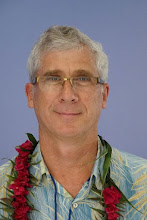Last month, the abbot of the Benedictine Monastery in Hawaii, Fr. David, invited me to come and speak with the community and oblates. The oblates meet once a month for education and for training. I enjoy having the opportunity to speak with folks, and to share with them aspects of the Celtic tradition. This is an important story, and I am happy to share it. I weaved my presentation around the theme of "The Celtic Roots of Benedictine Spirituality". That subject allowed me to share some of the history and background of Celtic Christianity and to touch on many of the overlaps between both spiritual traditions. In one sense we're cousins, and Celtic spirituality played a role akin to John the Baptist, helping to prepare the way.
First of all, the monastery is located in the most perfect of settings; atop the mountains on the North Shore. One has to pass fields of sunflowers, and scores of peacocks and horses, before finally arriving at the monastery itself. Second, the community is so very welcoming and friendly. This is a perfect setting to have a retreat, or spiritual day away from one's usual daily chores. I met one woman who had been on retreat and you could tell that she loved the place, and was somewhat reluctant about returning home. If you could see the place, you would understand! If your in Hawaii, or even visiting, you should go.
I closed the presentation by citing some passages from Morris Berman's The Twilight of American Culture (2000), a stinging criticism of American pop culture. In this book, Berman finds the model of the Celtic Church, with its emphasis on learning and education, as a potential model to combat what he refers to as "McWorld", a mindless consumer driven world, that has no other goal in sight than consumption.
The quote is worth citing in full:
"The traditional view-which is at least partly correct-is that during the sixth and seventh centuries, when the lights were going out, monasteries, especially Irish ones, began to stow away the nuggets of intellectual achievement from Roman civilization, and to a lesser extent, Greece. By 700, writes the British historian Hugh Trevor-Roper, "European learning had fled to the bogs of Ireland". While Europe was sacked by Goths, Arabs, and Vikings, a few scholars such as the Venerable Bede (circa 673-735; lived at the Jarrow monastery in Northumbria) preserved a knowledge of the classics, carrying the seeds of Western life "through the grim winter of the Dark Ages". In the seventh century alone, two hundred monasteries were founded in Gaul". (pg. 77)
In other words, monasteries, monks, and oblates, hold a key to the future. They can help claim back a predominantly pagan culture by keeping the learning going, and in remaining true to our Western intellectual and cultural foundations. In this way, classical learning triumphs over political correctness, with the emphasis on the "new monastic" person, the "inner monk", which we all are called to develop. In so doing, each person will reject the false values of our time, and work to preserve the historical treasures of our Christian civilization. To quote David Knowles, that great historian of monasticism, the monasteries "became centres of light and life in a simple, static, semi-barbaric world, preserving and later diffusing what remained of ancient culture and spirituality". (pg 78)
There is hope for our time, and it lays nestled in churches and the monastery. What wonderful irony! A pearl laying there like a hidden treasure. There is a model that has worked in the past, in similiar times to our own. That model is none other than the Celtic monastery, and Celtic Christianity.
Many thanks to members of the Benedictine community and the oblates for their warm and hospitable welcome!
Sunday, January 3, 2010
Subscribe to:
Post Comments (Atom)





No comments:
Post a Comment